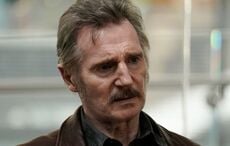The Tribeca Film Festival in downtown Manhattan goes from strength to strength each year, and 2008 is no exception. A stellar line-up of new Irish films will also be offered to entertain film buffs. CAHIR O'DOHERTY reports.
FOUNDED in 2002 by legendary screen actor Robert De Niro, the Tribeca Film Festival was created in response to the distinct loss of vitality in the downtown neighborhood after the 9/11 attacks. This year, with over 250 films and 1,000 screenings planned, the festival has become one of the most prominent in the world, totally reenergizing the area in the process.
At the 2008 festival, which starts on April 24, three impressive new Irish films will receive their U.S. premieres, each in their own way exceptional new works, heralding the arrival of important new directing talents.
The first new Irish film, Eden, is a feature length screen adaptation of Eugene O'Brien's critically acclaimed award-winning play of the same name. Set in a thriving town in Co. Offaly, Eden tells the story of one tumultuous week in the lives of Billy and Breda Farrell as they approach their 10th wedding anniversary.
Breda is secretly determined that the milestone will reignite the passion in their already floundering marriage - but Billy, on the other hand, has developed an unhealthy obsession with Imelda Egan, a pretty but completely unobtainable local young thing. He has somehow convinced himself that the coming weekend will see them become lovers under the eyes of everyone.
As the anniversary date draws closer, Billy's behavior becomes more and more erratic, while Breda's frustrations crystallize and find increasingly high-risk expression. In their desperation and loneliness, both partners act out their own inner turmoil, and the film is something of a departure in its searing portrait of a typical Irish marriage coming unglued.
Says director Declan Recks, "It's a portrait of a very recognizable type of Irish marriage - between a stoic, fairly quiet Irish guy with a lot going on beneath the deceptively placid surface, and his wife who feels adrift in a fairly joyless marriage.
"Billy never talks about himself; he just observes others, keeps himself to himself. In that way he's a fairly classic Irish man - but we show the downside too. At 40 he's horribly, woefully stuck, right in the middle of his life.
"People aren't used to seeing the Irish male portrayed in this way. We highlighted the drinking aspect of his life too. In Ireland there's not a lot of discussion about that. But we portrayed his drinking in a negative light."
In Eden, booze isn't so much a benign social pastime as a cheaper form of anti-depressant. Billy uses it to self-medicate, to keep the lid on, to escape. That in itself represents a departure in Irish filmmaking on the issue.
Says Recks, "Going out with the lads and getting drunk is rarely portrayed negatively in Irish film or in society. But there is a flipside and we explore it in the film. I think some audience members weren't comfortable with the results.:
Recks admits that he was thrilled to hear that the Tribeca Film Festival was picking up Eden for its American premiere. "It has no big stars, no name, and so to get it shown here at the festival raises its profile. We were delighted to have been selected."
Throughout Eden Recks and O'Brien maneuver the emotional complexities of their painfully recognizable Irish characters, focusing on the little details of their daily lives and giving equal footing to both their commendable and devastating capacities for good and ill.
Recks' skilled eye frames every scene with masterful precision, and O'Brien naturally transfers his material from stage to screen with a rare facility, keeping its original depth intact.
But it's the powerful performances by actors Aidan Kelly and Eileen Walsh that breathe life into the film from start to finish. Eden, like marriage itself, reveals how sometimes the little things matter most.
Mister Lonely, directed by Harmony Korine (controversial director of arthouse hits Kids and Gummo) is a France and Ireland co-production with a multicultural cast brought to the screen by Irish producer James Flynn.
A poetic rumination on identity and art, we follow a callow young Michael Jackson impersonator through Paris, where he performs on the streets to make ends meet. One day in a show in a retirement home, Michael falls for a beautiful Marilyn Monroe look-alike who suggests he move to a commune of impersonators in the Scottish Highlands.
Reflecting on the reality of his life, he immediately says yes and joins them at the seaside castle, where he discovers everyone is preparing for the commune's first-ever gala - Abe Lincoln, Little Red Riding Hood, the Three Stooges, the Queen, the Pope, Madonna, Sammy Davis Junior, even Marilyn's daughter Shirley Temple and her possessive husband Charlie Chaplin. It's a mind blowing sequence and as theatrical as it is cinematic.
Says Korine, "It wasn't my intention to make a movie about Madonna or Marilyn Monroe or Michael Jackson. I wanted to make a movie about the obsessive nature of people who impersonate others, living as icons in a communal setting.
"I wasn't so much interested in the people they were impersonating, but more the character underneath. What type of human being looks at a celebrity icon and not only admires them like fans, but takes it a step further? For them, it's not enough to just enjoy the celebrities they admire.
They make a decision: 'I am going to live through that person. I am going to take that character's identity for myself and somehow sustain a living by pretending to be that person at different functions, like retirement homes or car shows.'"
Korine admits that he was also interested in the disconnect - where does the impersonator begin and the impersonation end? That's why in the film the characters don't have names. They call themselves by the first names of the people they impersonate.
He then took it a step further by having them live in a commune to show they've decided to live full time in the skin of the people they impersonate.
The resulting film is a wild ride that examines our double-edged relationship with celebrity - movie stars are the stuff of dreams, and we're willing to idolize them as long as they play by our rules (not their own).
New Boy, directed and written by Stephanie Green, is one of the most interesting new short features to have come out of Ireland in years. A sensitive and intermittently hilarious meditation on the journey to the new multicultural Ireland, Green handles the provocative material with such grace and humor that you want to cheer by the film's end.
Being the new boy at school isn't easy if you're trying to fit in and make friends, but if you're African and facing your first day at an Irish school things can get out of hand quickly.
Based on Roddy Doyle's hilarious short story, Green has retained the riotous humor of Doyle's version and has managed in the process to expand and deepen the story's themes with a rare degree of cinematic sophistication.
The short but surprisingly resonant drama about an African boy's first footsteps in Ireland gains greater resonance when the film reminds us of the steps that he has already taken. One day his father, a teacher in an African school, is led out of the classroom by military thugs.
By the time the new boy has arrived in Ireland he's already an orphan. Marvelously, Green handles this material with the sensitivity of an acrobat. It's an uncommonly strong debut.
The Tribeca Film Festival runs from April 23 to May 4. Tickets can be purchased at the Festival Box Office, located at 15 Laight Street (between Varick and Sixth Avenue, one block below Canal Street) from 11 a.m.-7 p.m., seven days a week. Call 646-502-5296 or email [email protected].




Comments